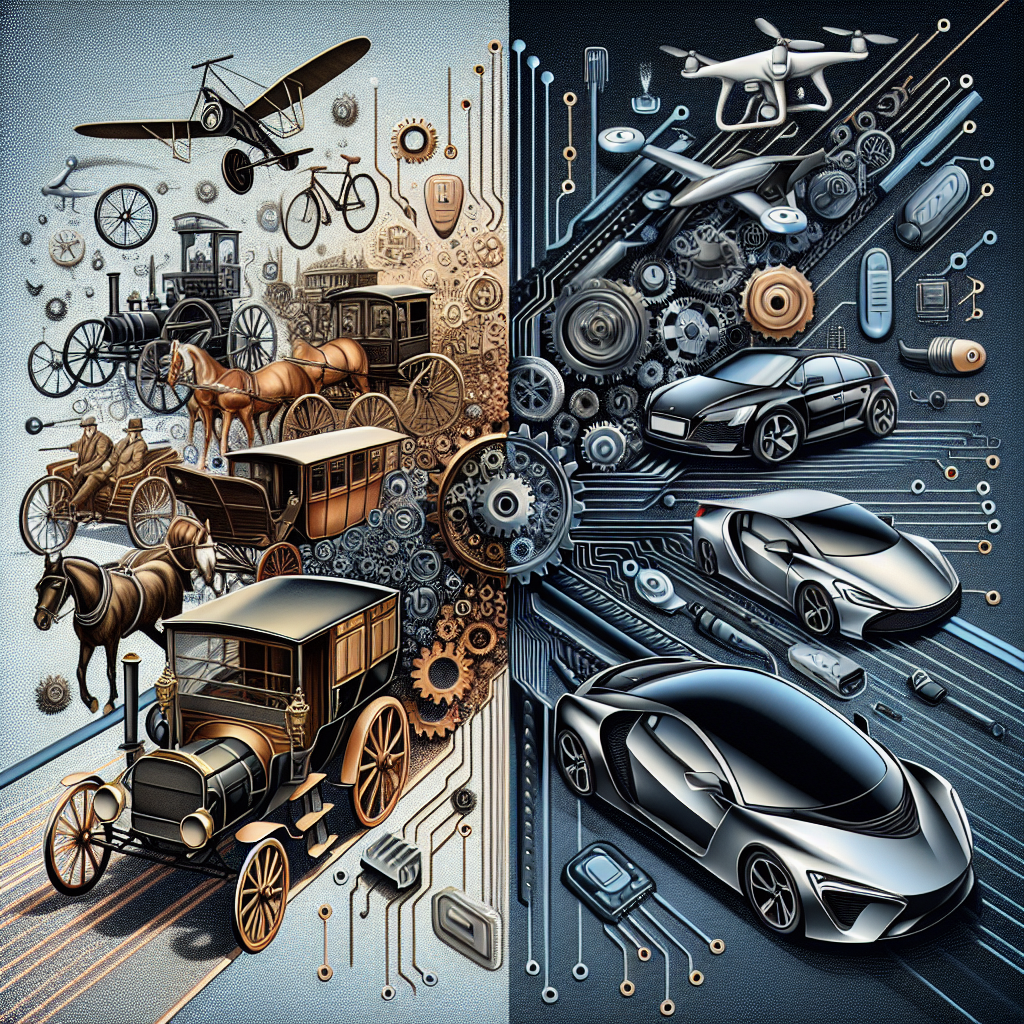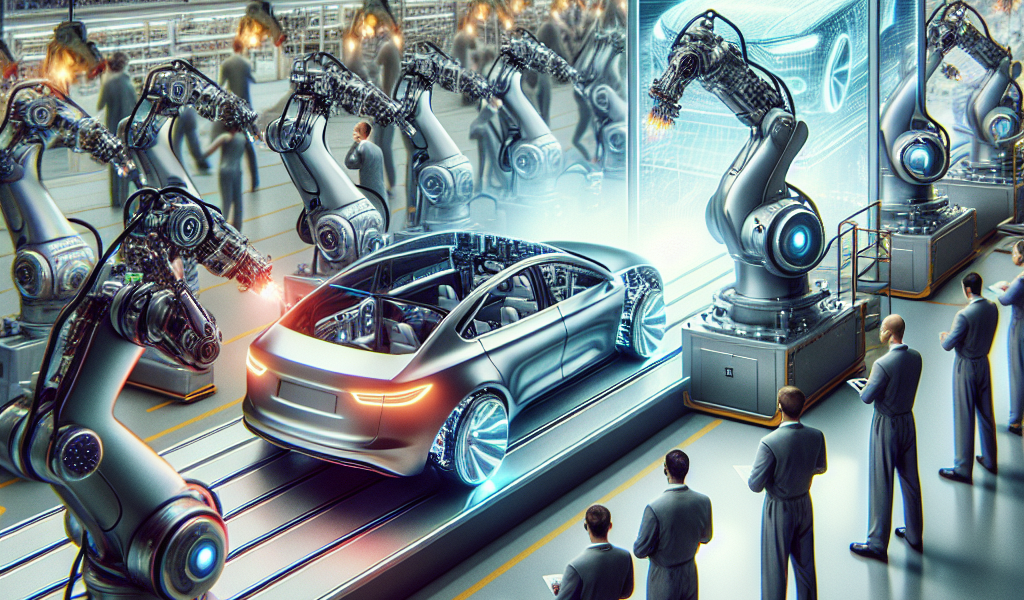-
Table of Contents
“Driving Innovation: The Transformative Power of Technology in the Automotive Industry”
Introduction

The automotive industry has undergone a profound transformation over the past few decades, driven by rapid advancements in technology. From the development of electric and autonomous vehicles to the integration of sophisticated software and connectivity features, technology has revolutionized the way vehicles are designed, manufactured, and operated. This evolution has not only enhanced the efficiency, safety, and sustainability of automobiles but has also reshaped the entire landscape of the industry, influencing everything from production processes to consumer experiences. As we delve into the impact of technology on the automotive sector, it becomes evident that these innovations are paving the way for a future where mobility is smarter, greener, and more interconnected than ever before.
Autonomous Vehicles: Revolutionizing Road Safety and Efficiency
The automotive industry has been undergoing a seismic shift, driven by the rapid advancements in technology. Among the most transformative innovations are autonomous vehicles, which promise to revolutionize road safety and efficiency. As we delve into this topic, it becomes clear that the implications of self-driving cars extend far beyond mere convenience.
To begin with, the potential for autonomous vehicles to enhance road safety is immense. Human error is a leading cause of traffic accidents, accounting for approximately 94% of all crashes. By removing the human element from driving, autonomous vehicles can significantly reduce the number of accidents. These vehicles are equipped with an array of sensors, cameras, and radar systems that provide a 360-degree view of the surroundings, allowing them to detect and respond to potential hazards more quickly and accurately than a human driver ever could. Moreover, advanced algorithms enable these vehicles to make split-second decisions, further minimizing the risk of collisions.
In addition to improving safety, autonomous vehicles are poised to enhance traffic efficiency. Traditional driving is often plagued by inefficiencies such as stop-and-go traffic, which not only wastes time but also increases fuel consumption and emissions. Autonomous vehicles, on the other hand, can communicate with each other and with traffic management systems to optimize routes and maintain steady speeds. This level of coordination can lead to smoother traffic flow, reduced congestion, and lower environmental impact. Furthermore, the ability of these vehicles to operate continuously without fatigue means that they can be utilized more effectively, potentially reducing the need for additional vehicles on the road.
Another significant benefit of autonomous vehicles is their potential to increase accessibility for individuals who are unable to drive. Elderly people, those with disabilities, and others who are currently dependent on public transportation or the assistance of others could gain newfound independence through the use of self-driving cars. This increased mobility can improve their quality of life, allowing them to participate more fully in social and economic activities.
However, the transition to a world dominated by autonomous vehicles is not without its challenges. One of the primary concerns is the ethical dilemma of decision-making in critical situations. For instance, in the event of an unavoidable accident, how should an autonomous vehicle prioritize the safety of its passengers versus that of pedestrians or other drivers? These are complex questions that require careful consideration and the development of robust ethical frameworks.
Moreover, the widespread adoption of autonomous vehicles will necessitate significant changes to existing infrastructure. Roads, traffic signals, and signage may need to be updated to accommodate the new technology. Additionally, cybersecurity is a critical issue, as the interconnected nature of autonomous vehicles makes them vulnerable to hacking and other malicious activities. Ensuring the security and reliability of these systems is paramount to gaining public trust and acceptance.
Despite these challenges, the potential benefits of autonomous vehicles are too significant to ignore. As technology continues to advance, it is likely that we will see a gradual but steady increase in the presence of self-driving cars on our roads. Policymakers, industry leaders, and the public must work together to address the challenges and harness the full potential of this revolutionary technology. In doing so, we can look forward to a future where our roads are safer, more efficient, and more accessible for everyone.
Electric Cars: Driving Towards a Sustainable Future
Electric cars are no longer a futuristic concept; they are rapidly becoming a significant part of our present reality. As the automotive industry evolves, the shift towards electric vehicles (EVs) is not just a trend but a necessary step towards a more sustainable future. This transformation is driven by a combination of technological advancements, environmental concerns, and changing consumer preferences.
One of the most compelling reasons for the rise of electric cars is their potential to reduce greenhouse gas emissions. Traditional internal combustion engine vehicles are major contributors to air pollution and climate change. In contrast, electric cars produce zero tailpipe emissions, making them a cleaner alternative. This environmental benefit is particularly crucial as governments worldwide set ambitious targets to combat climate change. For instance, the European Union aims to cut carbon emissions by at least 55% by 2030, and electric vehicles are a key component of this strategy.
Moreover, the technological advancements in battery technology have significantly improved the viability of electric cars. Early models of EVs were often criticized for their limited range and long charging times. However, recent innovations have led to the development of more efficient batteries that offer longer ranges and faster charging capabilities. Companies like Tesla, Nissan, and Chevrolet have introduced models that can travel over 300 miles on a single charge, addressing one of the primary concerns of potential EV buyers.
In addition to environmental and technological factors, consumer attitudes towards electric cars are also shifting. As awareness of climate change grows, more people are considering the environmental impact of their choices, including their mode of transportation. Electric cars are increasingly seen as a practical and responsible option. Furthermore, the cost of owning an electric vehicle is becoming more competitive with traditional cars. While the initial purchase price of an EV can be higher, the lower operating and maintenance costs often make them more economical in the long run. Government incentives, such as tax credits and rebates, also play a significant role in making electric cars more accessible to a broader audience.
The infrastructure supporting electric vehicles is also expanding rapidly. Charging stations are becoming more common, making it easier for EV owners to recharge their vehicles. Companies like ChargePoint and Electrify America are investing heavily in building a robust network of charging stations across the country. This growing infrastructure alleviates the “range anxiety” that many potential EV buyers experience, further encouraging the adoption of electric cars.
However, the transition to electric vehicles is not without its challenges. The production of EV batteries requires significant amounts of raw materials, such as lithium, cobalt, and nickel, which raises concerns about the environmental and ethical implications of mining these resources. Additionally, the current electricity grid in many regions may need upgrades to handle the increased demand from widespread EV adoption. Addressing these issues will require coordinated efforts from governments, industries, and communities.
Despite these challenges, the momentum towards electric cars is undeniable. The automotive industry is investing heavily in research and development to overcome these obstacles and make electric vehicles more efficient, affordable, and sustainable. As technology continues to advance and infrastructure improves, electric cars are poised to play a crucial role in driving us towards a more sustainable future. The journey may be complex, but the destination promises a cleaner, greener world for future generations.
The Role of AI in Enhancing Automotive Manufacturing and Design
Artificial Intelligence (AI) has become a transformative force in the automotive industry, revolutionizing both manufacturing and design processes. As car manufacturers strive to meet the growing demands for efficiency, safety, and innovation, AI has emerged as a critical tool in achieving these goals. The integration of AI into automotive manufacturing has led to significant improvements in production efficiency. By utilizing machine learning algorithms, manufacturers can predict potential equipment failures before they occur, thereby minimizing downtime and reducing maintenance costs. This predictive maintenance capability ensures that production lines run smoothly, ultimately leading to higher output and better quality control.
Moreover, AI-driven robots are now a common sight on factory floors. These robots are not only capable of performing repetitive tasks with precision but can also adapt to new tasks through machine learning. This flexibility allows manufacturers to quickly reconfigure production lines to accommodate new models or changes in design, thereby reducing the time-to-market for new vehicles. Additionally, AI-powered quality control systems use computer vision to inspect parts and assemblies with a level of accuracy that surpasses human capabilities. This ensures that defects are identified and rectified early in the production process, leading to higher-quality vehicles and increased customer satisfaction.
Transitioning from manufacturing to design, AI is also playing a pivotal role in shaping the future of automotive design. Designers are now leveraging AI to create more innovative and efficient vehicle designs. Through generative design algorithms, AI can explore a vast array of design possibilities, optimizing for factors such as weight, strength, and aerodynamics. This not only accelerates the design process but also results in vehicles that are more fuel-efficient and environmentally friendly. Furthermore, AI is enhancing the customization options available to consumers. By analyzing data on consumer preferences and behaviors, AI can help designers create personalized features and options that cater to individual tastes. This level of customization was previously unattainable and is now becoming a key differentiator in the competitive automotive market.
In addition to improving design and manufacturing processes, AI is also contributing to the development of autonomous vehicles. Self-driving cars rely heavily on AI to process vast amounts of data from sensors and cameras, enabling them to navigate complex environments safely. The continuous advancements in AI technology are bringing us closer to a future where fully autonomous vehicles are a common sight on our roads. This shift promises to enhance road safety, reduce traffic congestion, and provide greater mobility for individuals who are unable to drive.
As we look to the future, the role of AI in the automotive industry is only expected to grow. The ongoing advancements in AI technology will continue to drive innovation, leading to smarter, safer, and more efficient vehicles. However, it is important to recognize that the integration of AI also presents challenges, such as the need for robust cybersecurity measures to protect against potential threats. Nevertheless, the benefits of AI in enhancing automotive manufacturing and design are undeniable, and its impact will be felt for years to come.
In conclusion, AI is revolutionizing the automotive industry by improving manufacturing efficiency, enhancing design capabilities, and paving the way for autonomous vehicles. As car manufacturers continue to embrace AI, we can expect to see even more groundbreaking innovations that will shape the future of transportation. The journey has just begun, and the road ahead is filled with exciting possibilities.
Conclusion
The impact of technology on the automotive industry has been profound and multifaceted, driving significant advancements in vehicle safety, efficiency, and connectivity. Innovations such as electric and autonomous vehicles, advanced driver-assistance systems (ADAS), and smart manufacturing processes have revolutionized the industry, leading to more sustainable and intelligent transportation solutions. These technological advancements have not only enhanced the driving experience but also contributed to reducing environmental impact and improving overall road safety. As technology continues to evolve, the automotive industry is poised for further transformation, promising even greater strides in innovation and efficiency.




